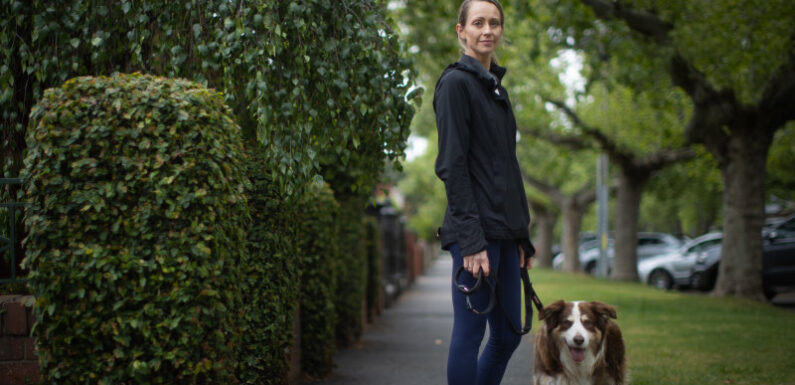
Save articles for later
Add articles to your saved list and come back to them any time.
Every Melbourne council is using a weed killer that a World Health Organisation agency says probably causes cancer, despite residents and the council workers’ union calling for it to be banned.
Three councils – Port Phillip, Frankston and Brimbank – recently reintroduced glyphosate-based weed killer after phasing it out following community concerns about possible links to some types of cancer.
Albert Park resident Michelle Ronan is calling on her local council to reverse its decision to reintroduce glyphosate as a weed killer. Credit: Simon Schluter
It comes as a landmark class action lawsuit plays out in the Federal Court in Melbourne involving 800 Australians who claim their diagnosis of non-Hodgkin lymphoma is linked to using glyphosate-based weed killer Roundup.
Jennifer Marriott, the president of the Municipal and Utilities Workers Union, said it was concerning that councils were using a substance that was banned in many parts of the world.
Glyphosate has been prohibited for household use in France, the Netherlands and Belgium, and total bans exist in Vietnam and some US cities. Germany will completely ban the controversial herbicide by the end of the year.
“If something has been stopped it has been stopped for a good reason,” Marriott said.
A roadside where glyphosate is being applied.Credit: Emma Young
She called on councils to phase out glyphosate and hire additional staff to maintain parks and gardens using safer steam or manual alternatives.
According to Marriott, councils use glyphosate because it is cheaper and speedier than these options.
She said the risks of using glyphosate were heightened on windy days and when council workers weren’t wearing gloves, breathing apparatuses and goggles.
Michelle Ronan, who lives in Albert Park, is among a group of concerned residents calling on Port Phillip Council to reverse its July 5 decision to reintroduce glyphosate as a weed killer. They have started a petition that will be presented to the council.
Ronan spends a lot of time outdoors with her nine-year-old daughter, four-year-old son and border collie and is concerned they might inadvertently come into contact with glyphosate sprayed by the council.
“The literature suggests that there is a risk to children and adults associated with the use of glyphosate,” she said. “If there is a risk, then why do it?”
She said the council was exposing itself to potential liability by using the product.
This masthead contacted Melbourne’s 31 councils and they all confirmed they were using glyphosate but stressed it was sprayed sparingly and not in sensitive areas such as playgrounds or near childcare centres and schools.
Many of the councils referenced Deakin University research commissioned by the Municipal Association of Victoria, which found glyphosate significantly reduced weed coverage for up to 12 weeks with no negative impact on soil, insects or microorganisms.
The councils are also zapping weeds with steam, using non-glyphosate herbicides and manually pulling them out. Some have established a “no spray” register for residents who don’t want chemical herbicides sprayed on council land adjacent to their homes.
Port Phillip Council acting Mayor Andrew Bond said the council reintroduced glyphosate-based herbicides following a thorough investigation by council officers, which considered academic and industry advice. The reintroduction followed a rise in complaints about weeds.
Bond said the weed killer would only be sprayed in low-risk open spaces such as laneways and roadside reserves and not in open space areas where run-off may immediately enter waterways.
“We use signage and food dyes to let people know when spraying is happening,” he said.
But residents like Ronan said it made no sense for the council to deem glyphosate safe in some areas and risky in others. “It’s either safe or it isn’t,” she said.
Debate continues to rage about whether glyphosate, which is one of the world’s most popular herbicides, causes cancer.
The Australian Pesticides and Veterinary Medicines Authority has concluded that glyphosate does not pose a cancer risk and last month the European Commission proposed to renew the use of the herbicide for another decade after a report by the European Food Safety Authority failed to identify “any critical areas of concern”.
But the World Health Organisation’s International Agency for Research on Cancer declared in 2015 that the substance was “probably carcinogenic to humans”, triggering a wave of lawsuits around the world.
Andrew Watson, the national head of class actions at Maurice Blackburn Lawyers, said the cancer sufferers involved in his firm’s case against Roundup manufacturer Monsanto had experienced pain, suffering and lost income.
“It’s a debilitating illness and the treatment is pretty difficult,” he said.
Bayer, which purchased Monsanto in 2018, has spent $US10 billion ($15.6 billion) settling thousands of lawsuits from people who allege exposure to Roundup caused their cancer.
But it insists these settlements include no admission of liability or wrongdoing.
A spokeswoman for Bayer said glyphosate-based herbicides had been rigorously tested in hundreds of studies, with an extensive body of science concluding they were safe when used as directed and did not cause cancer.
“Bayer fully stands behind its glyphosate-based products, which have been used around the world for almost 50 years,” she said.
Start the day with a summary of the day’s most important and interesting stories, analysis and insights. Sign up for our Morning Edition newsletter.
Most Viewed in National
From our partners
Source: Read Full Article

